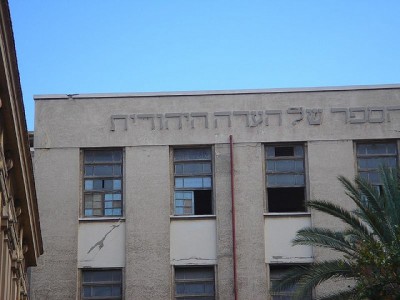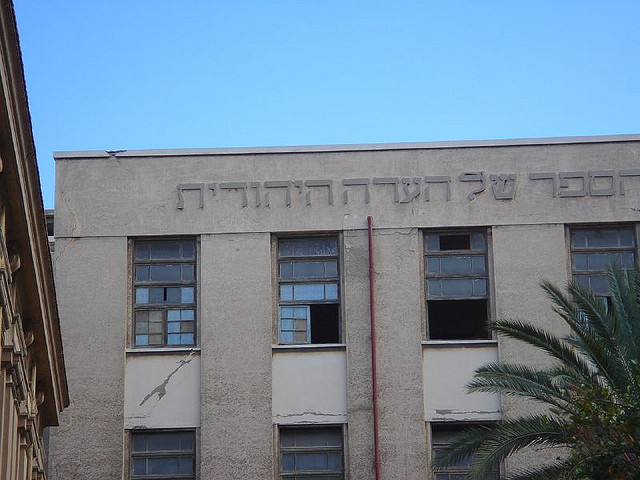
I’ve written before on my day school education and its different aspects, critiquing how it taught me (or perhaps should have taught me) to look at my history and my past; I’ve also offered what can perhaps be best described as a back-handed compliment to my Jewish education. Now, as someone who has been out of the pre-college Jewish educational world for almost a year, I have begun to think about the lasting impact that my twelve years of elementary and secondary Jewish education has had on me.
One the one hand, my back-handed compliment still stands: in high school especially, I was incredibly cynical, especially when it came to studying rabbinic legal texts. To a certain extent, I still am, even if I’ve elected to continue studying those very same texts as part of my higher education at the Jewish Theological Seminary. In high school, however, I found it difficult to relate to the texts that I was reading — partially because the intricacies of how to build a sukkah and whether or not it can be built in the public domain, or who is guilty of murder in the case when a baby is thrown off a roof and lands on a person carrying a sword and dies, were not relevant to my life. Interesting to ponder and debate though these legal issues may have been, they had little effect on my day-to-day interactions and realities as a Jew.
Instead, one of the most formative years for my Jewish education, and, especially my seven years of elementary and secondary Talmud education, was in eleventh grade, when I had a teacher who took the tractate we were studying, connected it to Enlightenment thinkers and biblical and contemporary texts, and forced us to synthesize those texts in a way we had not been asked to do before. For the first time, I felt that the Jewish texts weren’t talking down to me, but talking to me. This was the first time studying Jewish texts meant something to me. The rabbis of the sixth century CE were not only in conversation amongst themselves, but with me and with Søren Kierkegaard and Immanuel Kant and with rabbinic commentators. It was then that I truly felt that the texts I was studying were Not In Heaven — not in the sense that they were immutable and everlasting, but in the sense that they mattered to me and had implications for me today.
While I am grateful for my Jewish education (and recognize the serious sacrifices my parents had to make to afford it), it failed to instill within me much of the drive to be an actively engaged, traditionally observant Jew. My Judaic studies teachers, by virtue of their own upbringing and education, were, on the whole, farther to the religious right than I and my peers were, and the rift between us showed. My teachers, especially in middle school, wanted to be rebbes to students who wanted educators. While we wanted to question, we couldn’t. The rabbinic texts were meant to be studied and memorized (and that, in my case, meant literally memorized), not to be pondered and debated. The debates we studied in the Talmud had happened once, but could happen no longer in our day and age. Instead, we were told, as I was, in eighth grade, that our job was to learn and to be able spit it back on an exam to show that we knew the material. We were discouraged from questioning or taking issue with the texts we studied — after all, how could we compare to the sages of old?
In his interpretation of Genesis 21:17, the medieval French commentator Rashi, notes that when God says that God heard Ishmael’s prayers “[W]here he is,” God reached out and helped Ishmael not because of what Ishmael’s heirs would do to the Israelites in the future (it is said that Ishmael begot the Arabs), but because of the fact that, in that moment, Ishmael was righteous. Equally as important, however, was the fact that God reached out to Ishmael by giving him more water, and not by (necessarily) miraculously healing him. God was willing to meet Ishmael on his own terms, and was able to see that Ishmael merited saving in that moment.
Among the most significant critiques of Modern Orthodoxy today is the dearth of stalwartly Modern Orthodox educators, especially as Yeshiva University, long considered the flagship institution of Modern Orthodoxy, has moved further to the religious right and repeatedly opposed practices that are becoming markers of Modern Orthodoxy, such as women donning tefillin and partnership minyanim. Part of the problem I faced in my years of Jewish education was that most of my teachers were not willing to meet me or my peers “where we were,” but instead seemed intent on teaching us in the way that they had been taught. This is not bad (and I don’t think I can blame my teachers for that), but it is not conducive to creating students to who feel empowered within their religion. They see a religion that doesn’t allow them to ponder and to question, and feel powerless.
We, the Jews, are a bookish people and a bookish religion, and if we are not allowed to study the texts that have formed our religion — and, in the case of the Talmud, are really the basis for the rabbinic Judaism that we have today — on our own terms, then we will simply turn away from those texts and abandon that which forms the basis of our religion. If we are taught these texts in a way that makes them seem obsolete and antiquated, then that is how we will view them.
So, to my former teachers, I ask: please do not force our religion down our throats. Please, meet us where we are. Show us that texts that were redacted centuries ago can maintain their relevance today, and can be seen and interpreted in a modern light. Give us the tools we need to not only learn the basic text, but also the tools to interrogate and question the text so that we might internalize it.
Amram Altzman is a student at List College.

